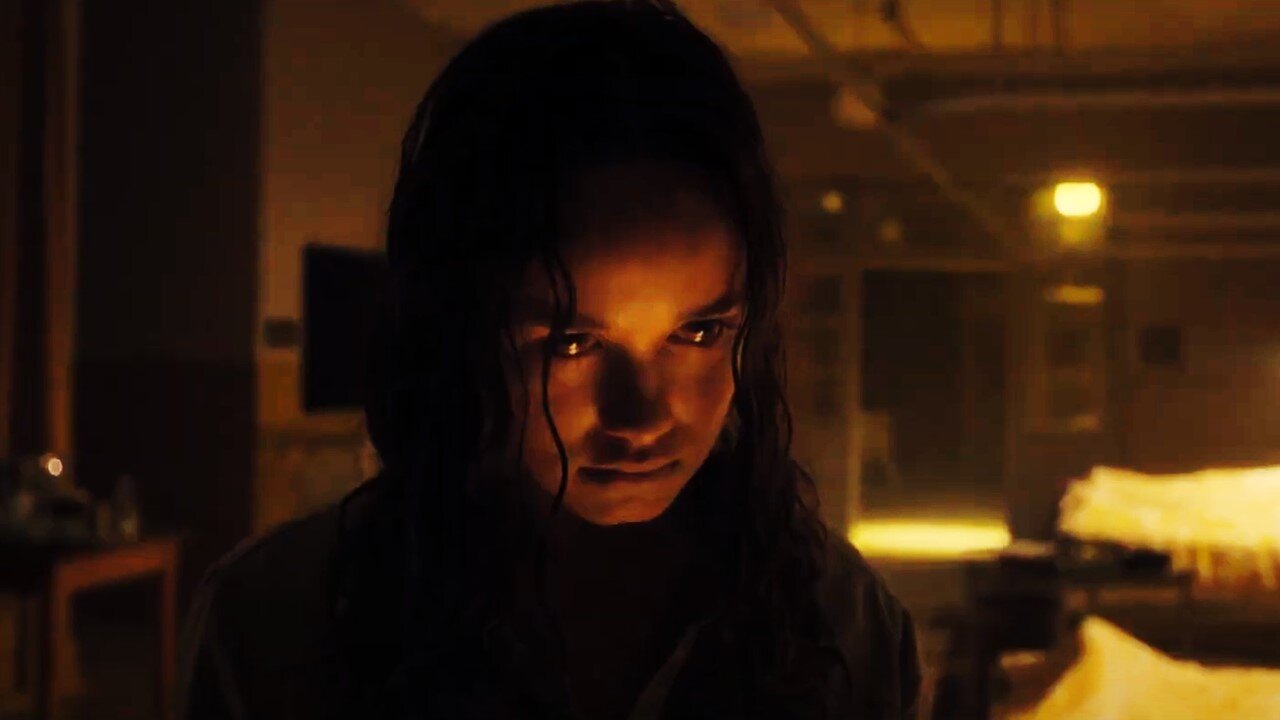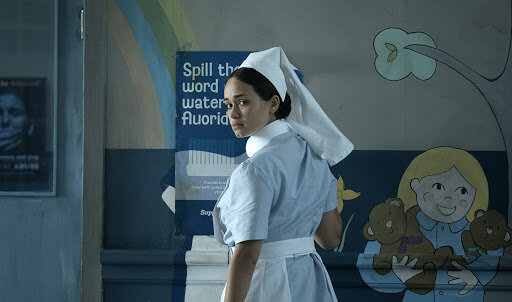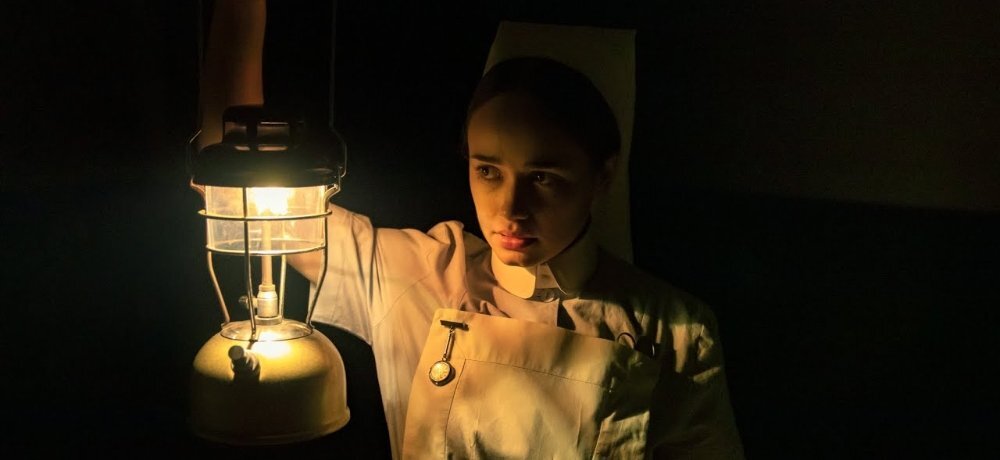[Film Review] The Power (2021)

Nyctophobia, otherwise known as fear of the dark, is considered by some to be one of the oldest fears known to mankind. Fear of the dark is the fear of the unknown, the fear of the possibility of what may be lurking where we cannot see it. Corinna Faith’s film The Power attempts to confront that fear of the unknown, both out in the dark and within ourselves.
In early 70s London a young nurse named Val (Rose Williams) is preparing for her first shift, full of enthusiasm for the job and ready to help people. Unfortunately, all she encounters is a stern matron and jaded co-workers. To make things worse, she’s been assigned to work the lonely night shift during one of the regular power cuts, and the dark brings up traumatic memories for Val. There’s also something else walking the corridors of the hospital in the dark, something that has dark secrets of its own and will do anything to be heard.

The biggest strength of The Power is in its lead performance. Rose Williams balances troubled naivete with a certain unique edge that works so well. Val quickly forms a bond with a young patient, her fear is palpable and genuine, and her awkwardness with the other nurses, particularly one who knows a version of her past, drives your curiosity to find out more of the character’s history. She is the classic repressed ghost story protagonist, and that is reflected in the way she’s pin-perfect and buttoned up in her nurse’s uniform at the beginning, but as the night goes on and strange things happen, she becomes more and more undone, both physically and emotionally. She also becomes a conduit for the spirit in the hospital in ways that reflect her own trauma, and the scenes of her twisting and writhing are certainly effective. It’s also never clear whether Val’s behaviours are a genuine phenomenon or the by-product of a fragile mind breaking.
In terms of atmosphere,, there is nothing to fault as Faith knows exactly how to use space and build the best atmosphere for this kind of story. Every dark corridor looks the same but also like a never-ending void. The layout of the hospital map also has a yonic feel the more you look at it, bringing up sexuality in a way that is very relevant to the plot.
So why then does The Power fall short when it has all these great elements working in its favour? The pacing drags in a few areas, meaning that while the story both starts and ends very well it gets a little muddled in the second act. That might not have been so bad if the film could have carried itself through that with great scares, but The Power never gets much beyond atmospheric eeriness. The possession scenes, whilst impressively done, aren’t anything special and many of the rest of the scares fall into the “it’s behind you” category.

In some ways The Power reminds me of 2018’s The Devil’s Doorway, a retro found footage film directed by Aislinn Clarke about two priests investigating a possible miracle in a Magdalen Laundry. Both films deal with the supernatural in a recent period setting, both feature strict institutions with a measure of corruption, and most particularly, both films feature real-life horrors that in many ways are so much worse than anything otherworldly. Here the title The Power can be applied to the film twofold; the obvious premise of the power cuts, but also in the ever-present theme of those with and without power in a hierarchical sense, and the rage and desire for retribution that those who are abused by those in power feel. However, where The Devil’s Doorway had moments that really hit you, there’s nothing quite on that level in The Power.
This is a small creepy gem that (whilst not containing the most intense scares), uses both its central performance and its location to good effect in telling its story and is worth seeking out for fans of ghost stories.


RELATED ARTICLES
What if evolution wasn’t finished with us? That’s the question at the heart of Flights of Reverie (2025), the feature debut of director Li Wallis. The film sees British ornithologist Jack Hastings (John Dooley) travel to Berlin, which has been gripped by paranoia following several mysterious deaths.
Confessions in Static is an exploration of the True Crime genre, and its ethics and effects on society, but it fails to deliver that message in a satisfying or novel way.
Overall, Stalker is a pretty solid short film with some very tense moments and an excellent performance from its lead actress. It’s not perfect, and some of the deeper stuff went over my head, but I’m glad I watched it. I think it’ll stick with me for a while, even if I’m still not sure what it all meant.
There is something paradoxical about the idea of a weekend getaway, searching for comfort by taking ourselves out of our comfort zones. Perhaps the change of scenery, a disruption in routine, an escape from the pressures of our daily lives, will reveal to us a path towards solitude.
The Bone Temple is the sequel to 28 Years Later that we deserve. Director Nia DaCosta took the beauty and spectacle that Danny Boyle gave us with 28 Years Later and turned it up to eleven. It’s darker, more disturbing and more… camp? Deliciously, delightfully camp.
The atmosphere seeping from every pore of this film is certainly its biggest strength; however, the narrative and structure fall quite short of the intended impact.
According to the opening credits of the film, the Darknet is a place feverishly depraved to the point of questioning if humanity even exists, with a slathering of heinous crimes committed all for the purchase and pleasure of the sick individuals that find themselves beholden to their inner most sadistic wants.
If you know me at all, you know that I love, as many people do, the work of Nic Cage. Live by the Cage, die by the Cage. So, when the opportunity to review this came up, I jumped at it.
When V/H/S first hit our screens in 2012, nobody could have foreseen that 11 years later we’d be on our sixth instalment (excluding the two spinoffs) of the series.

EXPLORE
Ahead of the Academy Awards ceremony, Ghouls has rounded up where you can stream all of the 2025 horror releases in the UK and the US from the comfort of your own home.
Now it’s time for Soho’s main 2023 event, which is presented over two weekends: a live film festival at the Whirled Cinema in Brixton, London, and an online festival a week later. Both have very rich and varied programmes (with no overlap this year), with something for every horror fan.
In the six years since its release the Nintendo Switch has amassed an extensive catalogue of games, with everything from puzzle platformer games to cute farming sims to, uh, whatever Waifu Uncovered is.
A Quiet Place (2018) opens 89 days after a race of extremely sound-sensitive creatures show up on Earth, perhaps from an exterritorial source. If you make any noise, even the slightest sound, you’re likely to be pounced upon by these extremely strong and staggeringly fast creatures and suffer a brutal death.
If you like cults, sacrificial parties, and lesbian undertones then Mona Awad’s Bunny is the book for you. Samantha, a student at a prestigious art university, feels isolated from her cliquey classmates, ‘the bunnies’.
The slasher sub genre has always been huge in the world of horror, but after the ‘70s and ‘80s introduced classic characters like Freddy Krueger, Michael Myers, Leatherface, and Jason, it’s not harsh to say that the ‘90s was slightly lacking in the icon department.
Mother is God in the eyes of a child, and it seems God has abandoned the town of Silent Hill. Silent Hill is not a place you want to visit.
Being able to see into the future or back into the past is a superpower that a lot of us would like to have. And while it may seem cool, in horror movies it usually involves characters being sucked into terrifying situations as they try to save themselves or other people with the information they’ve gleaned in their visions.

![[Film Review] Flights of Reverie (2025)](https://images.squarespace-cdn.com/content/v1/5fe76a518d20536a3fbd7246/1769111579457-CTUW03G3J34P6SFRWWEM/flights-of-reverie-filmstill-ornithologist-berlin-li-wallis06.jpg)
![[Film Review] Confessions in Static (2025)](https://images.squarespace-cdn.com/content/v1/5fe76a518d20536a3fbd7246/1768397467245-3KOF3LUBRDQVJ8QVDONA/Confessions_Key_Alternate_1920x1080.png)
![[Film Review] Stalker (2025)](https://images.squarespace-cdn.com/content/v1/5fe76a518d20536a3fbd7246/1768232505839-TS9K7YBLOXNQML8PUWTP/Screenshot+2026-01-12+at+15.17.49.png)
![[Film Review] Bone Lake (2025)](https://images.squarespace-cdn.com/content/v1/5fe76a518d20536a3fbd7246/1768151214859-U1AUN7JALKRK4W5NGJVH/Andra+Nechita+and+Maddie+Hasson+in+Bone+Lake+%28Signature+Entertainment%29+1.jpg)
![[Film Review] 28 Years Later: The Bone Temple (2026)](https://images.squarespace-cdn.com/content/v1/5fe76a518d20536a3fbd7246/1768152692285-7TK6SN62JY4H3TJDYABP/The+Bone+temple.jpg)
![[Film Review] Pelverata (2025)](https://images.squarespace-cdn.com/content/v1/5fe76a518d20536a3fbd7246/1767549668681-1TW6BD7QQHK8WS8L4IVT/Screenshot+2026-01-04+at+17.57.01.png)
![[Film Review] A study of the human ability to endure self-inflicted pain in XXXDarknet: Red Lips](https://images.squarespace-cdn.com/content/v1/5fe76a518d20536a3fbd7246/1767542371615-YUJBD442MS9NAGEB45D7/redlips.jpg)
![[Film Review] Sympathy for the Devil (2023)](https://images.squarespace-cdn.com/content/v1/5fe76a518d20536a3fbd7246/1697186986143-QDVLQZH6517LLST682T8/Screenshot+2023-10-13+at+09.48.52.png)
![[Film Review] V/H/S/85 (2023)](https://images.squarespace-cdn.com/content/v1/5fe76a518d20536a3fbd7246/1697455043249-K64FG0QFAFVOMFHFSECM/MV5BMDVkYmNlNDMtNGQwMS00OThjLTlhZjctZWQ5MzFkZWQxNjY3XkEyXkFqcGdeQXVyMTUzMTg2ODkz._V1_.jpg)













![[Editorial] Oscar Nominations 2026: Where to stream all the horror picks](https://images.squarespace-cdn.com/content/v1/5fe76a518d20536a3fbd7246/1769113319180-4INRRNMZK4DZLHRSUXX5/rev-1-GRC-TT-0026r_High_Res_JPEG-1024x372.jpeg)
![[Editorial] 10 Films & Events to Catch at Soho Horror Film Fest 2023](https://images.squarespace-cdn.com/content/v1/5fe76a518d20536a3fbd7246/1700819417135-299R7L4P0B676AD3RO1X/Screenshot+2023-11-24+at+09.41.52.png)
![[Editorial] 9 Horror Nintendo Switch Games To Play](https://images.squarespace-cdn.com/content/v1/5fe76a518d20536a3fbd7246/1697214470057-3XZXX8N4LYIMDFWS6Z3P/Screenshot+2023-10-13+at+17.20.13.png)
![[Mother of Fears] Mothering in Silence in A Quiet Place (2018)](https://images.squarespace-cdn.com/content/v1/5fe76a518d20536a3fbd7246/1696445921315-HZJ2DZYQIH6VVWXBO2YL/Screenshot+2023-10-04+at+19.52.29.png)
![[Editorial] 5 Female Focused Horror Book Recommendations](https://images.squarespace-cdn.com/content/v1/5fe76a518d20536a3fbd7246/1696441981361-52EQCTJ7AT2QF1927GM7/919xtm6d3fL._AC_UF894%2C1000_QL80_.jpg)
![[Editorial] 9 Best Slashers Released Within 10 Years of Scream (1996)](https://images.squarespace-cdn.com/content/v1/5fe76a518d20536a3fbd7246/1695478839037-LOFHGVM3H6BMSZW7G83M/Screenshot+2023-09-23+at+15.15.11.png)
![[Mother of Fears] Mother Vs. Monster in Silent Hill (2006)](https://images.squarespace-cdn.com/content/v1/5fe76a518d20536a3fbd7246/1695485781119-H6GNP0G3J2TLPAOIABV7/Screenshot+2023-09-23+at+17.11.56.png)
![[Editorial] 9 Terrifying Cerebral Visions in Horror Movies](https://images.squarespace-cdn.com/content/v1/5fe76a518d20536a3fbd7246/1693509801235-X23OL50T1DVGECH0ZJK2/MV5BMjQ0MTg2MjQ4MV5BMl5BanBnXkFtZTgwMTU3NDgxMTI%40._V1_.jpg)

The life of a Silent Hill fan is a turbulent one. For every Silent Hill 3, there’s a Silent Hill: Homecoming. For every Silent Hill 2 Remake, there’s a Silent Hill: Ascension. For every Silent Hill f, there’s a Return to Silent Hill, and thus, the pendulum continues to swing, this time into frustrating - but expected - disappointment.